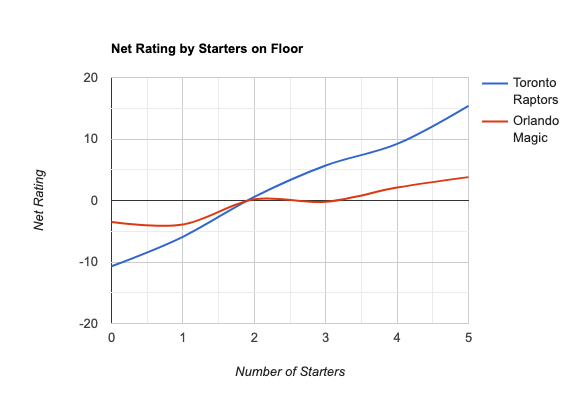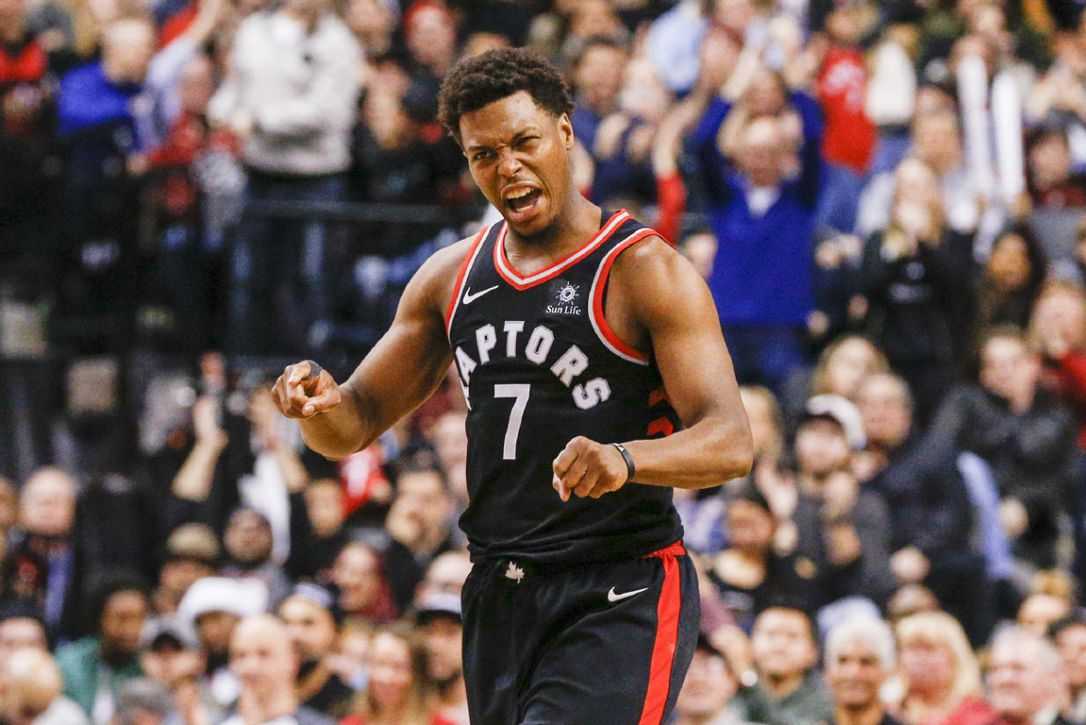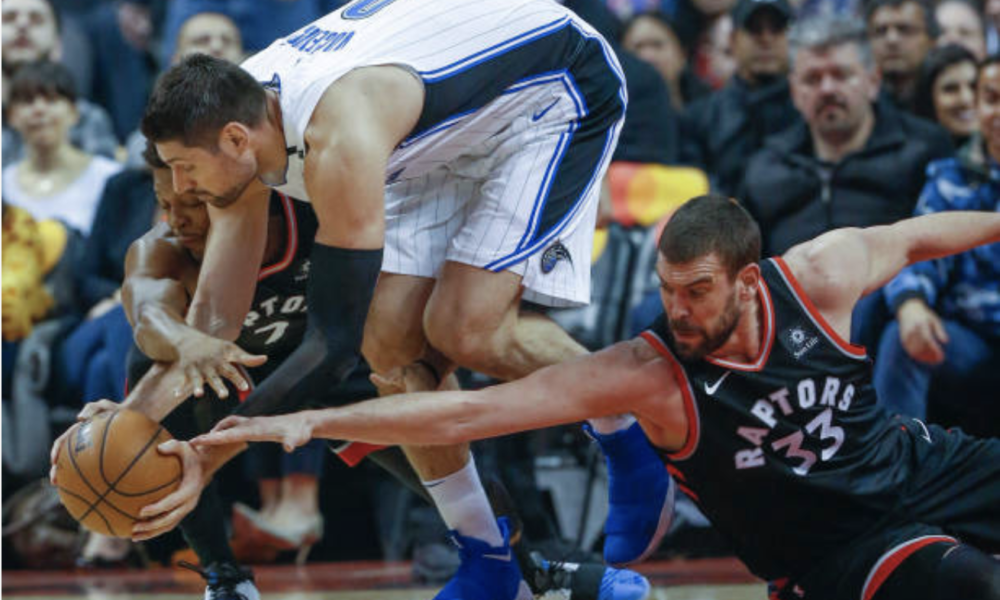After 177 days of Toronto Raptors basketball, two mammoth trades, and the blossoming of Pascal Siakam into Jesus Christ Superstar before our eyes, it’s finally time for playoff basketball. We found out last night that the Raptors would face the Orlando Magic in the first round of the playoffs, and you can find the schedule here. But before the games actually start, we’ve got to prep every conceivable angle of the series. Let’s get to it.
The Basic Numbers
Toronto is simply a far better team than Orlando. The Raps finished 58-24, while the Magic struggled to a 42-40 record. Toronto has more talent at every position other than center, and they have dramatically more playoff experience, with 500+ combined playoff games on Toronto’s roster and fewer than 100 on Orlando’s.
Orlando split the season series 2-2 with Toronto, with the score differential actually 30 points in Orlando’s favour over the four games. They’re no easy out. Here have been the teams’ statistical category leaders in the four regular season matchups.
[table id=15 /]
Orlando does have some solid numbers in their relative favour against the Raptors. For one, they are one of the league’s best defences. They especially stymied Toronto, who only managed the league’s sixth-worst offensive net rating against the Magic, sandwiched between the New York Knicks and Chicago Bulls. Orlando in general boasted the league’s eighth-best defensive rating (Toronto was fifth-best), as Aaron Gordon and Jonathan Isaac are two of the league’s most fearsome defenders from the wing position. The fact that Gordon and Isaac matched up against Toronto’s best scorers, in Kawhi Leonard and Pascal Siakam, is probably the single biggest reason why Toronto struggled to score. You’ll see a more detailed matchup breakdown later.
Orlando’s success in those matchups is no fluke. Gordon and Isaac ranked 12th and 13th, respectively, among power forwards, per Jacob Goldstein’s defensive PIPM. Orlando combined their stingy defence with the league’s seventh-lowest pace and sixth-lowest turnover rate to keep games sludgy, with few high-percentage looks for either teams. Orlando wants to slow the game down and let Vucevic create medium-efficiency looks, hoping those will outdo whatever the opponent can manage on the other end.
Orlando’s numbers in the second half of the season, since February 1, are even better. They have the league’s second-best defence, and the fourth-best net rating (behind Toronto at third). They are not a normal 7-seed. Orlando is a very good team, and they are more dangerous than any other possible matchup Toronto could have drawn in the 2-7 bracket.
Still, Toronto is a far better team than Orlando. Toronto’s offence is dramatically better, with more creators, more shooters, and more margin for error. As good as Orlando’s defence has been, Toronto is probably better there, too. The Raptors should be able to win in a slow, half-court battle, but if the game turns into a track meet, the Raptors will quickly put the wood to their opponents. Per CTG, Toronto added the most points per game in transition of any team in the league, whereas Orlando was 22nd. There are a number of ways Toronto can win the series, and really only one way Orlando can come out on top.
Starter Matchups
Let’s start with the likely starters for the series.
Toronto:
PG: Kyle Lowry
SG: Danny Green
SF: Kawhi Leonard
PF: Pascal Siakam
C: Marc Gasol
Orlando:
PG: DJ Augustin
SG: Evan Fournier
SF: Aaron Gordon
PF: Jonathan Isaac
C: Nikola Vucevic
Now who actually guarded who, and how did each player have success in those matchups? Some of the matchup data is skewed, as Toronto has only had Gasol on the roster for two of the four games the two teams have played. Lowry and Leonard have both missed a game. But here have been the most frequently used matchups between starters, starting with Toronto on offence.
(A few notes: First, sorry for the formatting. Second, the numbers between row and column is the number of possessions the offensive and defensive players saw matched up. The numbers in brackets are field goal makes and field goal attempts.)

And here’s the same with Orlando on offence and Toronto on defence.

This is a ton of information, so let’s distill it a little bit. First, Kawhi Leonard is a monster on defence. Even in his slack regular season, he has been ridiculous. Orlando is not an offensive juggernaut by any means, with an offensive rating on the season of 108.1, good for 22nd in the league. In three games against the Magic, Leonard only saw 13 Orlando field goals attempted while he was the primary defender. That’s ridiculous. Players have to be actively avoiding him at that rate. Gordon attempted 10 shots in 100 possessions against Leonard. With Gordon’s usage rate of 21.8, the expected attempts would have been 22.
Toronto’s offence, however, has come in fits and starts in the matchup. They’ve posted an offensive rating of 112.5 on the season, but just 101.3 against the Magic. Lowry, Green, Leonard, and Siakam have all shot poorly against their primary defenders, especially Siakam against Isaac. The Magic are long and athletic on defence, and Siakam and Leonard will need to solve that puzzle. Perhaps the saving grace for Toronto has been Gasol. Vucevic is the Magic’s least mobile defender, by far, and Gasol’s range opens the floor significantly. The Magic will live with Gasol shooting, rather than spreading to the line and opening the floor for Toronto’s attackers; Gasol should be ready to hoist from behind the arc. He shot 9-18 in 78 possessions against Vucevic in two games, so expect Gasol to have a higher usage rate in this series than his usual.
Other general points from the matchup data:
- Orlando is not willing to switch their bigs onto guards. Lowry attacking downhill in the 1-5 pick-and-roll could be an important weapon to pry open the floor and force Orlando into rotations. Lowry had the team’s second-highest offensive rating among rotation players (110.6), behind only his potential pick-and-roll partner, Gasol (128.3).
- Lowry has been a defensive monster in the series as well. Against non-shooting teams like Orlando, Lowry’s ability to cheat into the lane and muck up actions that don’t involve his man can destroy an offence. Toronto will want to stick him on a non-shooter away from the ball as much as possible, and he could see time on Isaac if Nurse wants to get really funky.
- Steve Clifford was happy to hide Augustin on Green in the final matchup between the two teams, which ended in a Toronto blowout. Green has punished small guards in the post this season. He shot 7-for-10 against Augustin across four games. Green will need to continue that trend if Orlando tries to slow Toronto’s attack by putting size on Lowry and hiding Augustin elsewhere.
- Other than Gasol, who Toronto will not switch ever, Toronto switched far more freely than Orlando in the regular season matchups. Green and Siakam were the only two players on either team to defend at least 10 possessions against each of the other team’s starters. Neither had great success defending their primary marks, but Toronto’s switching could play an important role in forcing Magic turnovers and kickstarting the Raptors’ deadly transition attack.
- Looking at lineup data, Toronto has a +8.8 net rating with the starters and Gasol and a -8.3 net rating with the starters and Ibaka. Each lineup has only appeared in one game, so chalk that up to low-minute variation and move on.
Bench Matchups
It’s been prophesied that Toronto’s bench is going to be its weakness in the playoffs, but that shouldn’t take place so early in the playoffs. Orlando probably isn’t deep enough to punish Toronto. Here are the likely bench players at each position for the teams. It’s worth mentioning that neither team will likely go 10 deep, but these are at least the first options, some positional designations notwithstanding, off the bench.
Toronto:
PG: Fred VanVleet
SG: Jeremy Lin
SF: Norm Powell
PF: OG Anunoby
C: Serge Ibaka
Orlando:
PG: Michael Carter-Williams
SG: Terrence Ross
SF: Wes Iwundu
PF: Jarell Martin
C: Khem Birch
Toronto’s starters have an advantage over Orlando’s, which has somewhat been born out in the four matchups. Lowry, Green, and Gasol all finished with positive plus-minuses despite the -30 net rating over the season series. For Green, who played in all four matchups, to have finished +9, is nothing short of miraculous. Toronto should win starter versus starter minutes, but bench minutes have given Toronto problems all year. In the four regular season matchups between Toronto and Orlando, Powell (-13), Siakam (-21), Lin (-23), Anunoby (-24), and Ibaka (-28) all finished with horrible plus-minuses while playing huge minutes in bench lineups. If that fivesome sees the floor against Orlando, the revolution will be televised.
However, the problem for the Raptors could continue to be non-starter versus non-starter minutes. Orlando’s bench players are as dangerous defensively as its starters. Wes Iwundu is a cinder block with legs, and he can capably defend Leonard or Siakam for short stretches. Khem Birch is a ridiculously long center, and he actually held opponents to the 8th-lowest field goal percentage around the rim. That could be a problem against inconsistent rim finishers like VanVleet, Powell, or Anunoby.
The problem for Orlando is that precisely one bench player can score, and Toronto fans know him well. Terrence Ross is as streaky a shooter as exists in the league, evidenced by his 35 points in his final regular season victory over the Charlotte Hornets. Ross sure played like he wanted the Raptors in the first round. Even though Ross never got going against Toronto in the regular season, only averaging 13.0 points per game on 29.2 percent from deep, he can put it together in a hurry. (As a funny sidenote, Ross was the only Orlando rotation player to post a negative plus-minus in the regular season against Toronto.) When Ross is hot, there’s little defensive players can do other than overplay to keep the ball out of his hands. It’s conceivable to imagine a scenario in which Toronto’s bench units struggle to score while Ross guns Orlando to a lead during a short 3-4 minute stretch.
Even with that scenario looming large in a pessimist’s mind, the numbers don’t entirely bear it out. In any situation without all five starters on the court, Orlando scored a poor 1.07 points per possession, per pbpstats. They took the second-worst shot quality league-wide in those scenarios, with 36.7 percent of shots coming in the midrange. Orlando’s defence gave up 1.08 points per possession, which is in itself a solid mark, especially considering the offensive struggles. In the same situations (any of 0-4 starters on the court), Toronto scored 1.09 points per possession and gave up 1.09 points per possession. Basically, for all of Toronto’s struggles with the bench on the year, Orlando has been slightly worse. Both teams are looking to tread water with the bench in game.
On the year, Orlando and Toronto have had very similar patterns in regards to net rating versus number of starters in the game. Stats taken from pbpstats.

Orlando is a little less awful with zero or one starter on the floor, and Toronto is far more dominant with three, four, or five starters on the floor. Again, because Toronto will likely keep their zero-starter minutes to zero in the playoffs, and one-starter minutes as low as possible, this looks like another advantage for the Raptors.
Offensive and Defensive Styles
Let’s get as granular as possible, because the night is still young and the coffee is still plentiful. Ever since acquiring Gasol, the Raptors have played a different brand of offensive basketball. Players have become far more willing passers, and Nurse has correspondingly ratcheted up the play-calling by degrees. The offence has turned into a semi-scripted ballet, rather than the unscripted, post-up and isolation-heavy march that it was before. Let’s break down the types of plays into another handy table.
[table id=16 /]
(This data is from nba.com’s publicly available synergy data, which does not include passes away from plays. This limits the usefulness of data. For example, Toronto’s post-ups are most threatening because if Leonard or Siakam achieve deep position, they draw help and kick the ball to a waiting shooter. Though the shot is created through the post-up, this data only includes it in the spot-up category. That’s why Toronto’s post-up and pick-and-roll numbers are so low, because the real meat of those possessions – hitting perimeter shooters after the ball touches the paint – isn’t included in the data.)
This is another potential overload of data, so let’s go through some of the information in order. First, Toronto is still far more likely to isolate than Orlando (which makes sense, as they have better isolation scorers). Toronto also shoots in transition almost twice as often as Orlando, and they finish a possession with the handler or roller in the pick-and-roll almost 25 percent more often. On the other hand, Orlando plays more often through the post and chases more offensive rebounds. Cleaning the defensive glass has been a nagging weakness all year for Toronto, and it will be imperative against Orlando.
Since February 1, because that’s around about when both teams became their current iterations in terms of style, both teams have trended in opposite directions in terms of passing. Toronto throws 315.8 passes per game, third-most in the league, and Orlando only 283.0, 9th-fewest in the league. However, Orlando averages more potential assists. The Magic are actually second in the league in what percentage of passes lead to assists (9.7), whereas Toronto is middle of the pack (8.7). This isn’t a normative thing, and neither number is better or worse. But it does have descriptive power on both teams’ offensive styles.
Orlando runs fewer actions in the half-court, toggling the ball between fewer hands. They probe less and attack more. Their guards, Augustin, Fournier, and Ross, are all empowered to pull up from deep without any passes on a possession. Augustin (38.6 percent) and Ross (37.7 percent) are both among the league’s top-5 most accurate high-volume pull-up shooters from deep.
Toronto has adapted to a tiki-taka style of basketball of late. At their best, the ball hits the paint, either through a creative entry to an isolation or a pick-and-roll, and then it pings out to the perimeter, where it stays ahead of defenders via a flurry of passes. Toronto will need to play creatively, as Orlando has proven that simple isolations from Leonard and Siakam won’t be able to score consistently.
Defensively, Orlando is relatively conservative. Vucevic is a drop-back big, which means that he isn’t asked to step too far away from the rim to defend high pick-and-rolls or off-ball screens involving opposing centers. Instead, he stays in the paint to corral the ball, while Orlando’s freakishly athletic wings rotate around the perimeter. The Magic are athletic and long enough to accomplish it without giving up too much space. They don’t force many turnovers (10th-fewest in the league), but they give up the fifth-lowest percentage of wide-open shots in the league.
Toronto is more versatile. They switch much more often through every position other than center, and Toronto is at its most comfortable when a wing – Green, Leonard, or Siakam – is guarding the ball. Lowry is a more threatening off-ball defender, anyway. Toronto uses the switch as a proactive weapon rather than a reactive salve. Siakam at his best switches three or four times in one possession, always staying as close to the ball as possible, wreaking havoc with his anticipation, quickness, and athleticism. Gasol isn’t the most mobile big, but Toronto is comfortable with either him or Ibaka blitzing pick-and-rolls on occasion. Gasol isn’t going to clean up messes on the defensive end, but his incredible ability to read plays means that when every other defender is doing his job, Gasol walls off all the remaining crevices. He picks up a lot of steals when Toronto contains the ball at the point of attack. He finished third in the league in defensive PIPM this year.
Prediction
With all this in mind, it looks like Toronto has a variety of advantages. Even if Orlando has some tactical nuances in their favour – specifically, Gordon and Isaac being able to defend without help Leonard and Siakam – Toronto has a superior starting group and bench. For Orlando to win, Leonard and Siakam have to continue to struggle against Gordon and Isaac, the game has to stay slow, Ross has to get hot, and Vucevic has to dominate the matchup with Gasol. Any of those are possible alone, but all happening together is unlikely. For Toronto to win, practically anything else has to happen. That’s a lot of ifs. Orlando is a relatively great 7-seed, and has been playing out of their minds for two-and-a-half months. Toronto is on another level. Let’s say Toronto in five.




